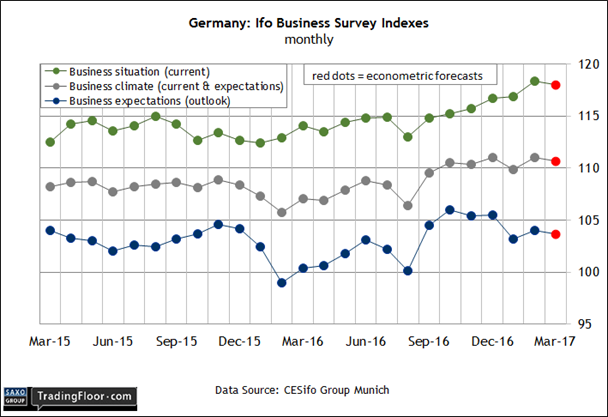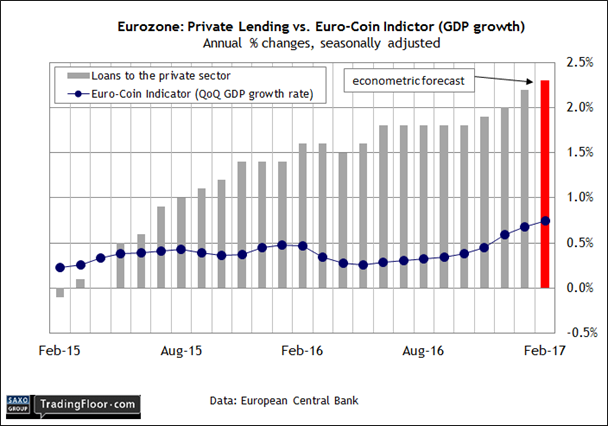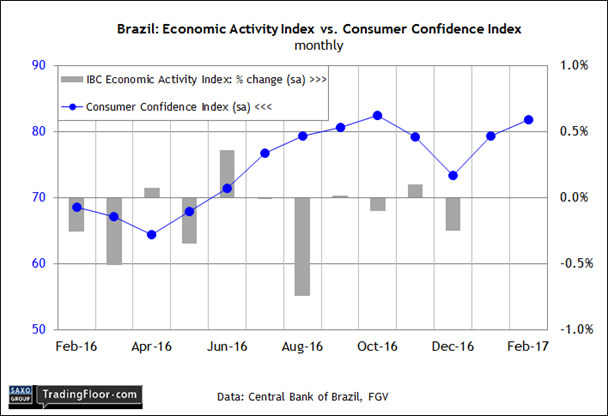- Ifo’s Business Climate Survey data to reaffirm Germany’s moderate growth outlook
- Lending to Eurozone households likely to tick higher in today's monetary release
- Brazil’s consumer sentiment data for March could offer clue on recovery prospects
A preliminary measure of Germany’s macro profile for March is on tap today with the release of Ifo survey data. Later, new data on lending to households in the Eurozone in February will dispense another clue on the health of the economic recovery in the first quarter. Meanwhile, the monthly update of consumer confidence in Brazil will be widely read for fresh insight into deciding if the country’s recession will end later this year.
Germany: Ifo Business Climate Survey (0800 GMT): Europe’s biggest economy remains on track to post solid gains in the near term, according to Markit’s PMI data for March. Last week's upbeat report suggests that today’s survey figures from Ifo will reaffirm that Germany’s economy is still humming along at a healthy pace.
The country’s Composite PMI increased to 57.0 for this month’s flash reading, touching a 70-month high. “Firms responded to capacity pressures in March, with the rate of job creation in the private sector almost matching the survey record set six years ago,” a senior Markit economist said.
The bubbly PMI report follows upwardly revised expectations for growth from the German Council of Economic Experts (GCEE), an academic group of policymakers. The council raised its growth forecast for the country to 1.7% for this year on a calendar-year basis, up fractionally from 1.6% in the previous estimate. The uptick is due to a healthy labour market, and a slight improvement in the outlook for the global economy, pro-cyclical fiscal policy in Germany, and the ongoing trend for expansionary monetary policy in the Eurozone, GCEE explained.
Today’s business survey data from Ifo isn’t likely to challenge the bullish tone that’s supporting the near-term forecast for Germany. Economists see a mild decline in today’s results, based on TradingEconomics.com’s consensus forecast, but the current situation index is expected to hold near a six-year high in March.
The expectations benchmark is softer and on track to edge lower today, but the consensus outlook still calls for a level that’s close to the strongest reading since late-2015.
In the wake of positive numbers from other sources, however today’s results overall will probably strengthen the view that moderate growth remains intact for the German economy in the months ahead.

Eurozone: Private Household Sector Loans (0900 GMT): Echoing the survey data for Germany, the flash estimate of the Eurozone PMI Composite for March rose to a six-year high in Friday’s release.
Economic momentum picked up speed, noted Markit’s chief business economist. “The acceleration in growth towards the end of the quarter, as well as improving trends in new business and an increased appetite to hire, suggest that strong growth momentum will be sustained into the second quarter,” he predicted.
Upward momentum is also expected for today’s monthly release on private lending in the euro area. A firmer trend, in fact, is old news in this corner. The annual growth rate in loans to households ticked up to 2.2% in January, the fastest pace since 2011 and a sign that economic activity is strengthening.
TradingEconomics.com’s consensus forecast sees the bullish tailwind inching up to 2.3% in today’s release. If so, the news will provide another clue for thinking that the macro trend for the Eurozone is on track to post stronger GDP growth in the first quarter. Now-casting.com’s current Q1 estimate is roughly 0.6%, up from 0.4% in last year’s Q4. The Euro-Coin Indicator, a GDP proxy, is anticipating even stronger growth of 0.7%-plus, based on the three months through February.
It’s still too early to know for sure how the official Q1 GDP report will stack up, but another encouraging number in today’s figures for lending will boost confidence that the broad trend is set to accelerate in the quarterly kickoff for 2017.

Brazil: Consumer Confidence Index (1000 GMT): Brazil's recession, the deepest on record, took an unexpected turn for the worse in last year’s final quarter. Its GDP contracted by 0.9%, more than expected and deeper than Q3’s 0.7% slide.
But analysts continue to look for a light at the end of the tunnel, including the head of Brazil’s central bank. Ilan Goldfajn, earlier this month, predicted the combination of monetary easing, lower inflation, and economic reform will lay the foundation for a mild expansion by the end of 2017. “This year will be the year when growth recovers,” he said at the G20 meeting of finance ministers earlier this month.
The stock market, however, has been hedging its bets lately. After reaching a six-year high late last month, Brazil’s Bovespa Stock Index is down 8% from the peak.
Deciding if the setback in equities is a pause that refreshes or the start of a reversal of fortunes is all about the economic numbers. Today’s update on the Consumer Confidence Index (CCI) offers an early clue on the macro trend in March. The good news is that this monthly sentiment index has been reviving in 2017 after slumping in last year’s fourth quarter.
Another increase in today’s release will provide cover for predicting that Brazil will turn the corner this year. A slide in CCI, however, may be a sign that 2017 will be more challenging than the optimists expect.
Some analysts are already warning that any rebound for the economy will be weak. “We see zero growth in 2017, or maybe just a little bit above that,” the chief economist at Banco Safra recently advised. “We should not see any big recovery this year; we will have to wait until 2018.”

Disclosure: Originally published at Saxo Bank TradingFloor.com
